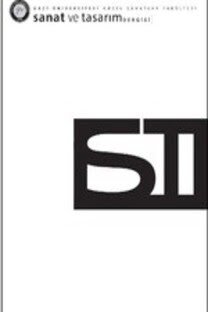GÖRSEL İLETİŞİM TASARIM EĞİTİMİNİN DEĞERLENDİRME SÜREÇLERİNDE ÜÇÜNCÜ GÖZ: BİR YAPAY ZEKÂ MODELİ
Yapay zekâ hemen her alanda olduğu gibi tasarım alanındaki varlığını giderek artırmaktadır.
Tasarım disiplininde ise tasarımcıların mesleki hayatında meydana getirdiği değişimler ile tasarım üretimini
otomatikleştiren uygulamalar veya yazılımlarla adından söz ettirdiği görülmektedir. “Yapay zekâ bir tasarımı
ürününü değerlendirebilir mi?” sorusundan hareketle, tasarım eğitiminde yapay zekânın potansiyeli üzerine
fikir yürütmenin ve tartışmaya açmanın önemli olduğu düşünülmektedir.
Bu çalışmada, gözetimli öğrenme kullanılarak görsel iletişim tasarımı ve grafik tasarımı bölümü öğrencilerinin
logo tasarımlarının yer aldığı sınıflandırılmış veri seti ile CoreML uzantılı bir yapay zekâ modeli hazırlanmıştır.
Veri setinde bulunmayan, sınıflandırılmamış logo örneklerinin yer aldığı bir kontrol grubu oluşturularak
model test edilmiş ve yapılan deney sonucunda ortaya çıkan çıktılar aktarılmıştır. Yapay zekânın tasarım
ilkelerini öğrenerek estetik çıkarımlarda bulunma potansiyeli ve tasarım eğitimindeki ölçme-değerlendirme
süreçlerinde alabileceği role ilişkin öneriler getirilmiştir.
Anahtar Kelimeler:
Yapay Zekâ, Yapay Zekâ Modeli, Görsel İletişim Tasarımı, Görsel İletişim Tasarımı Eğitimi.
THIRD EYE IN EVALUATION PROCESSES OF VISUAL COMMUNICATION DESIGN EDUCATION: AN ARTIFICIAL INTELLIGENCE MODEL
Artificial intelligence (AI) increases its presence in the field of design, as in almost every area. AI in
the design discipline is seen by the changes the designers have brought about in their professional life with
the application or software that automate the design process. It is essential to think about the potential of AI
in design education and open it up for discussion, based on the question “Can AI evaluate a design product?”
In this study, an artificial intelligence model with CoreML framework was created using supervised learning
with a classified data set containing logotypes designed by students of the visual communication design and
graphic design department. The model was tested by creating a control group with unclassified logotypes that
did not exist in the data set, and explained the result of the experiment. The potential of AI to make aesthetic
inferences by learning the design principles and their role in the assessment and evaluation processes in design
education is mentioned.
Keywords:
Artificial Intelligence, Artificial Intelligence Model, Visual Communication Design, Visual Communication Design Education.,
___
- • Bozkurt, A., Karadeniz, A., Baneres, D., Guerrero-Roldán, A. E., Rodríguez, M. E. (2021). Artificial Intelligence and Reflections from Educational Landscape: A Review of AI Studies in Half a Century. Sustainability, 13, 800. https://doi.org/10.3390/ su13020800
- • Müller, Andreas C. ve Guido, Sarah (2017). Introduction to Machine Learning with Python, USA: O’Reilly Media.
- • Michalski, R. S., Carbonell J. G. ve Mitchell, T. M. (1983). Machine Learning An Artificial Intelligence Approach. USA: Morgan Kaufmann.
- • Shalev-Shwartz, Shai ve Ben-David, Shai (2014). Understanding Machine Learning: From Theory to Algorithms. USA: Cambridge University Press.
- ISSN: 1308-2264
- Yayın Aralığı: Yılda 2 Sayı
- Başlangıç: 2015
- Yayıncı: Ankara Hacı Bayram Veli Üniversitesi
Sayıdaki Diğer Makaleler
Münip Melih KORUKÇU, Ahmet Ayaz YILMAZ
TEKİRDAĞ’DA MODERNİZM İLE KARŞILAŞMALAR: MİMARLIK, BETON VE HARABE
BAROK RESİM SANATINDA İSKENDERİYELİ AZİZE CATHERINE
Pınar GÖKLÜBERK ÖZLÜ, Cantürk ÖZ
GİYSİ UYGULAMALARINDA TASARIM İŞBİRLİKLERİNİN ÖNEMİ
İmran KAVAZ ALTUN, Tülay ZORLU
Gül AĞAOĞLU ÇOBANLAR, Buğru Han Burak KAPTAN
RESİM SANATINDA METAFİZİKSEL, FİZİKSEL VE RESİMSEL IŞIK ÜZERİNE BİR ARAŞTIRMA
TASARIM DÜŞÜNCESİ BİLEŞENLERİ VE İÇ MİMARLIK EĞİTİMİ ÇERÇEVESİNDE DEĞERLENDİRİLMESİ
Özlem KURT CAVUŞ, B. Burak KAPTAN
GÖRSEL İLETİŞİM TASARIM EĞİTİMİNİN DEĞERLENDİRME SÜREÇLERİNDE ÜÇÜNCÜ GÖZ: BİR YAPAY ZEKÂ MODELİ
